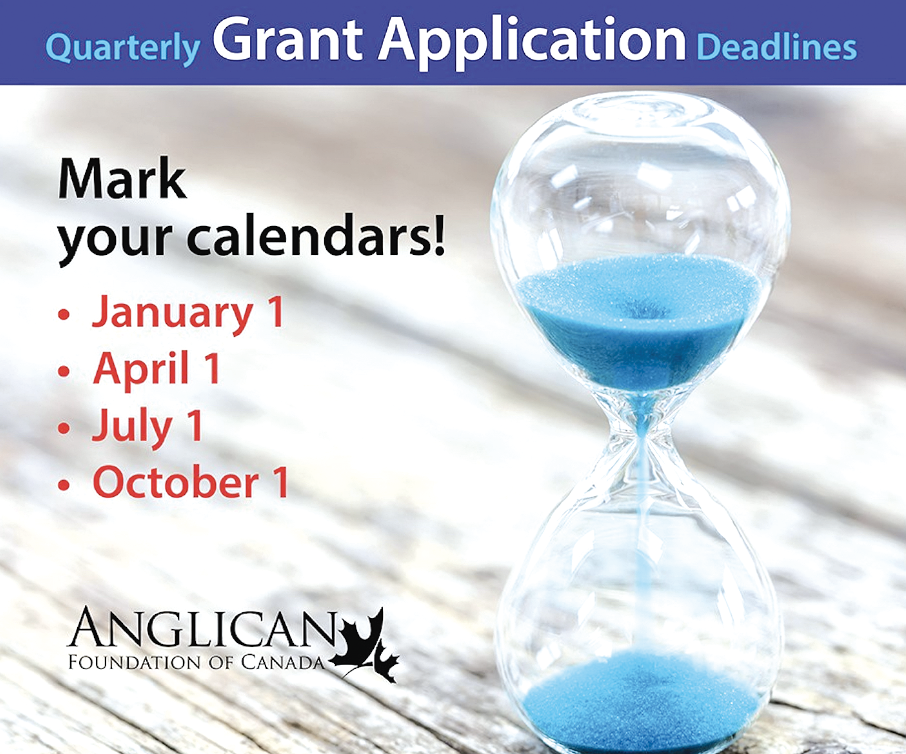AFC celebrating more than $257,000 in support of northern clergy housing fund
According to Dr. Scott Brubacher, Executive Director of the Anglican Foundation of Canada (AFC), “There has never been a swifter or more generous response to the establishment of a new fund than the ACW Council of the North Retired Clergy Fund to provide financial support for housing and living expenses to retired non-stipendiary clergy in the Council of the North.”
As of the end of December, more than $257,000 had been donated, with $250,000 having come from two donors. “The Diocese of New Westminster ACW provided $100,000 this past spring to launch the fund. Other ACWs across Canada then took up the challenge to do their part to support it as well. And then an incredible $150,000 arrived in early December as a memorial gift, from a donor who wishes to remain anonymous,” says Brubacher.
Brubacher says the speed with which this fund was established and the subsequent momentum to build it up has shown the power and potential of AFC to connect generous people to the philanthropic goals that are important to them. “In 2023 we will continue to work through the granting and disbursement process in partnership with the Council of the North. We expect to receive requests from retired clergy in need of assistance through the Council, and our goal is to begin to disburse funds to beneficiaries this year.”
It was in December 2020, in the wake of an article published in the Anglican Journal entitled “No Room in the Inn,” when Canadian Anglicans began to learn more about the plight of northern clergy through the homelessness experienced by Rev’d Jonas Allooloo, former dean of St. Jude’s Cathedral in Iqaluit, Nunavut. Widespread concern about this systemic issue prompted the Anglican Church Women in the Diocese of New Westminster to act.
“Non-stipendiary clergy have made the church in the North viable and yet they will not receive a pension from the Anglican Church,” says Gail Revitt, Past President, New Westminster ACW. “They have served all these years and have asked very little of the broader church. Our members felt called to respond to this housing crisis in a meaningful and tangible way.”
Proceeds from the sale of a property have put the ACW in New Westminster in the unique position of being philanthropic leaders in the church. In 2022, after consultations with Bishop David Lehman—Bishop of Caledonia and Chair of the Council of the North—the women voted unanimously to champion this cause. “We are greatly encouraged by the leadership gifts in support of this new fund, and we looked forward to working with ACW groups and others to strengthen the financial support network for retired clergy in the North,” says Brubacher.
“The council is very thankful to the New West ACW and the other visionary benefactors who have helped to launch and grow this fund so quickly,” says Bishop Lehman. “The response to date has given so much hope that we may look to a future where those who have served the church are well-served in their retirement.”
To make a gift to the ACW Council of the North Retired Clergy Fund please contact Michelle Hauser, AFC’s Development & Communications Officer at [email protected] or visit anglicanfoundation.org/donate.
Major changes to Anglican Foundation Grants Program
The Anglican Foundation of Canada’s (AFC) grants program will look substantially different in 2023 thanks to some important changes approved by the AFC Board of Directors in 2022. Effective January 1st, 2023, AFC moved from a semi-annual grant cycle to a quarterly one, with application windows open on January 1, April 1, July 1, and October 1 each year. According to Dr. Scott Brubacher, AFC’s Executive Director, “This rolling entry to the grants program will give potential applicants increased accessibility and flexibility, which is intended to result in timelier decisions.”
The Board also approved the introduction of Category A grants of up to $5,000 with no matching local funds required. “These category A grants were introduced for AFC’s 2021 Say Yes! to Kids Request for Proposal and proved very effective,” explains Rob Dickson, Chair, Grants Policy Working Group. “That experience demonstrated how the infusion of a few thousand dollars can have an enormously positive impact on ministry.”
The long-established traditional AFC grants—up to $15,000 and no more than 50% of the project budget—will become the new Category B grant.
Lastly, the Board approved the introduction of Category C grants of up to $50,000. “This new third category will allow the Board greater discretion in approving larger grants where the impact will be most beneficial,” explains Brubacher. “It will also allow AFC to be a more flexible funding partner in dioceses where a cornerstone project needs a major boost.”
Rob Dickson says the new and much larger Category C grants have the potential to be a game-changer for smaller dioceses. “The opportunity to submit a $50,000 grant request is well-suited to a diocese that may have the capacity to bring only one project per year, but a transformational project the entire diocese can rally around.”
Dickson says the Category C grant will be the one application a diocese is allowed to submit in a calendar year. In terms of the matching funding requirement for such a project, that will be left to the discretion of the AFC Board. Dioceses will need to articulate a strong case for merit, and the Board will have to evaluate these applications very carefully.
The Board also approved removing the requirement that grant applicants be current members of AFC. Dickson says, “It is more consistent with our value of generosity to invite applicants to donate out of a spirit of generosity to ‘pay it forward’.”
These changes mark the conclusion of AFC’s Grants Policy Working Group’s year-long review. “The Foundation’s role in resourcing a change-minded church in the wake of a global pandemic is only beginning to be defined,” says Brubacher. “We hope our members and friends across the Canadian church will see in these changes to our grant program a deep and genuine desire to resource the church as faithfully and abundantly as possible, so that we may drive change, together, with hope, courage, and vision.”
For more information on AFC’s new grant categories or to apply for an AFC grant, visit anglicanfoundation.org/apply.


